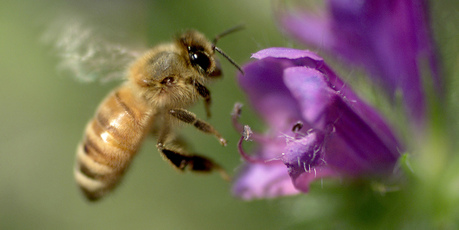
Fifty years ago, Rachel Carson warned that if we continued to spray vast quantities of pesticides indiscriminately over our farms, forests, and wildlife, we would end up with a poisoned world in which birds would no longer sing.
Few people listened to her warnings, in her book Silent Spring, and today 2.268 billion kilograms of pesticide are poured on to the planet every year. It's now almost impossible to find any place on earth where pesticide residues are not detectable. And almost every human being on earth is exposed to chemicals from conception until death.
There's also mounting evidence that the pesticide bombardment of our crops and farms is having a devastating effect on wildlife, and on beneficial insects like bees and monarch butterflies.
Scientists studying the steep decline in monarch butterflies around the world believe pesticides are one of the main culprits. The number of monarch butterflies surviving their long migration to Mexico from the USA and Canada this year dropped by 60 per cent. And the New Zealand Monarch Butterfly Trust has noticed a sharp decline in their numbers here too.
Scientists believe that pesticides used on vast tracts of soybeans and corn in America are one of the main culprits. They kill the milkweed that monarch butterfly larvae normally breed and feed on, and cause them to starve.
Pesticides are also the prime suspect in the disastrous decline in bee numbers that are being reported globally. A new generation of systemic pesticides, that work their way through a plant and into the pollen and nectar, are poisoning bees, even at very low doses.
The European Union has recently voted to suspend the use of three of these systemic, neonicotinoid pesticides on flowering crops and plants that are attractive to bees, and there are growing calls for a wider, global ban, as bee numbers plummet.
These systemic pesticides, which are widely used in New Zealand to coat seeds that farmers and growers use, are also poisoning birds. The authors of a new study claim that a single corn kernel coated with a neonicotinoid pesticide can kill a songbird, and even a tiny grain of wheat treated with these pesticides can fatally poison a bird. This is alarming, because bird populations, too, are in steep decline. The American Bird Conservancy estimates that pesticides poison around 15 million birds every year in America. It's calling for a ban on the use of systemic pesticides to coat seeds because of their toxicity to birds, as well as other wildlife.
Another widely used pesticide, diazinon, causes acute poisoning of birds. We don't know how many birds it's killing in New Zealand, but massive bird kills have been reported anecdotally, where granules of this pesticide have been used to control grass grub.
Frogs are also under threat from pesticides. Having survived for more than 250 million years, frogs are being wiped out all over the world by fungi, pollution, climate change, the loss of their natural habitats, and pesticide residues that end up in waterways where frogs live and breed.
Frogs have a highly absorbent skin, so they are extremely susceptible to pesticide poisoning. A recent American study found that a single spray of a pesticide on to a frog, at doses that are approved by regulatory authorities, can kill a frog within an hour.
Rachel Carson said it was ironic to think that man might determine his future by something as seemingly trivial as the choice of an insect spray.
This probably sounded far-fetched at the time. But today it is literally true. Some of the most widely used pesticides in New Zealand are killing beneficial insects that we rely on for our survival, like bees.
Astonishingly, pesticide use is not monitored in New Zealand. No data is collected officially about how many pesticides are used, and how frequently. Nor is there any requirement for pesticides to be tested on frogs, monarch butterflies, bees or other pollinators before they are registered.
We need a strategy to reduce our use of pesticides, as many countries already have in place, and tighter regulation and monitoring of pesticides. We also need much more research on the effect of pesticides on wildlife and beneficial insects, a publicly available pesticide database, and a requirement that farmers and growers report to the database what pesticides they use, how frequently, and in what quantity. Unless we introduce these sorts of policies, the destruction of wildlife and many beneficial insects will continue unabated.
